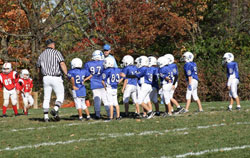Coach’s unique approach brings football team together

Coach Darrell Dolan huddles with the players from the third-grade football team at St. Simon the Apostle Parish in Indianapolis during the 2010 season. (Submitted photo)
By John Shaughnessy
When Darrell Dolan set his three special goals for the sports season, he knew they would be a challenge for his players and, even more, for him as a coach.
He just hoped that the three goals would bring out the best in him and the boys.
Maybe they could even serve as part of a blueprint for keeping sports enjoyable for children who are just beginning to play.
The first goal was completely within the control of Dolan, the head coach of the third-grade football team at St. Simon the Apostle Parish in Indianapolis.
Even though the Catholic Youth Organization requires that each football player gets to be on the field for at least eight plays during a game, Dolan vowed that each of his 17 players would get to play at least half of every game—even if his team was fortunate enough to play for the city championship.
And Dolan met that goal.
The second goal proved to be far trickier to accomplish. Of the 17 players on the team, 15 of them were under the weight limit—85 pounds—to be able to run the ball. So Dolan set his second goal—having every one of those 15 players score a touchdown or an extra point during the season.
“It turned out to be a lot more difficult than I anticipated,” Dolan says.
One of the main challenges was that there were just five regular season games. And after those five games, which included three losses, there were still six players who hadn’t scored.
“In the first game of the playoffs, I got four more kids to score,” Dolan says. “But going into the second playoff game, I had my doubts about getting that opportunity for the other two kids because the teams get stronger, and sometimes you don’t score at all.”
Before that second playoff game, one of the best moments of the season took place during a recess on the playground at St. Simon School. One of the football players who had scored during the season was practicing handoffs with one of the two players who still hadn’t scored.
The scene showed that the goal of the coach had become the goal of the team. The goodness of that moment matched the joy of the scene a few days later when everybody on the team celebrated that boy’s score during the second playoff game.
“We were all telling him, ‘Good job,’ and patting him on the back,” recalls Andrew Squier, a third-grade player. “It was pretty cool that everybody got to score. Everybody was really happy.”
Winning that game put the St. Simon team into a city championship game. Dolan again played every player at least half of the title game. Even though the team lost that game, Dolan has no regrets.
“By setting a standard of every child scoring and every child playing at least half the game, it can be a winning formula for 8-year-olds,” Dolan says. “It’s age-appropriate coaching. It resulted in the kids having a lot of fun.”
Then there was the third goal for the team.
“Every child was supposed to get an ‘A’ on his report card in math for the first quarter,” Dolan says. “We had quizzes before and after practice on the day before exams. And we had review sessions during practice if there wasn’t an exam the next day. We had nine of the 17 kids get an ‘A’ in math, and the team average was 95.062. We were very proud of that.”
When players earned an ‘A’ on a test, quiz or homework assignment for math, Dolan gave them a special decal to put on their football helmets. Earning an ‘A’ in a math situation was the only way a player could receive a decal.
“It inspired us to get a lot of good grades,” Andrew says.
His father described the season as a “terrific, very positive” experience for his son and his teammates.
“Playing time was distributed very fairly, and the athletic ability of the child never mattered,” Phil Squier says. “And when they were allowed to run the ball, let alone score, they were just ecstatic. It made their year.”
Those reactions made for a successful season for their head coach, too.
“I think the kids had a wonderful season,” Dolan says. “It’s hard to keep 17 kids and 17 sets of parents 100 percent satisfied, but overall the level of satisfaction was very good. When kids are having fun, and they don’t have the priority of winning, they feel more like a team.” †
